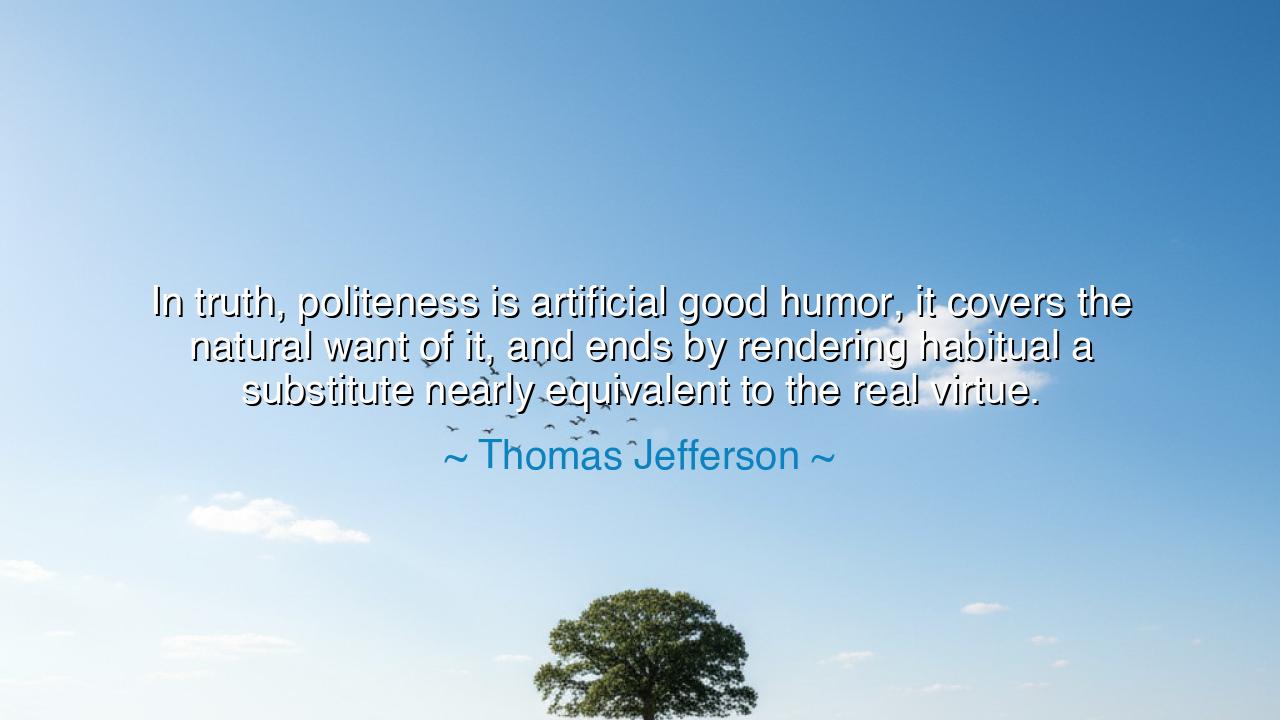
In truth, politeness is artificial good humor, it covers the
In truth, politeness is artificial good humor, it covers the natural want of it, and ends by rendering habitual a substitute nearly equivalent to the real virtue.






In the wisdom of Thomas Jefferson, one of the great architects of human liberty, there is a quiet and profound observation on the art of living among others: “In truth, politeness is artificial good humor, it covers the natural want of it, and ends by rendering habitual a substitute nearly equivalent to the real virtue.” What he teaches here is not merely about manners, but about the discipline of the soul — the way in which outward civility can become the training ground for inner goodness. For politeness, though born as imitation, if practiced with sincerity and perseverance, transforms itself into virtue; and that which was once mere appearance becomes reality.
In the beginning, politeness may indeed be an artifice — a mask we wear, a courtesy we extend even when the heart is weary or impatient. But is this falsehood? Nay, Jefferson tells us, it is the practice of becoming our better selves. Just as the warrior learns calm through ritual, and the sage learns peace through meditation, so too does the ordinary man or woman learn good humor through the repeated acts of restraint, grace, and measured kindness. Over time, the mask fuses with the face; what began as discipline becomes habit, and habit becomes nature. Thus, we shape ourselves not by waiting for goodness to arise within, but by acting as though it already does.
Consider the story of Marcus Aurelius, emperor of Rome and philosopher of the Stoic way. He was not born serene, nor immune to anger or sorrow. Yet through daily discipline, he learned to greet others with calm, to answer insult with patience, and to wear a demeanor of tranquil dignity even in war and plague. To his generals and servants alike, he appeared as a man of unshakable good humor — but that serenity was crafted, not gifted. Like Jefferson’s artificial politeness, it began as practice and ended as virtue. By playing the role of the wise and kind, he became, in time, truly so.
In this way, Jefferson speaks to the alchemy of character: the power of the outer act to shape the inner being. When one treats others with consideration, even if forced at first, one begins to see the humanity reflected in them. The habit of civility softens the heart, tempers pride, and awakens empathy. Politeness, then, is not deception; it is a bridge between our imperfect nature and our better potential. It is the training of the soul through the gestures of the body — the bow, the smile, the gentle tone that reminds both speaker and listener that they share in dignity.
Yet Jefferson’s words also carry a caution. For if politeness is left hollow — if it remains only surface and never seeps into the soul — it can become hypocrisy, a mask without a man behind it. The ancients despised such falseness, for it breeds manipulation rather than harmony. True virtue must grow from the practice, not remain in the pretense. The goal is not to deceive, but to discipline; not to appear kind, but to become so through repetition, through conscious effort, until the heart aligns with the gesture.
The origin of Jefferson’s reflection lies in his belief in self-governance — not only of nations but of the individual. Just as a republic depends on law to shape its citizens toward order and freedom, so does a person depend on the laws of conduct to shape the heart toward wisdom and grace. A people trained in courtesy will find it easier to live in peace, just as a person trained in good humor will find it easier to love. Civilization itself is built upon the very principle Jefferson outlines: that artificial virtue, practiced sincerely, becomes the bedrock of true morality.
And so, my listener, the lesson is clear: practice the virtues you wish to possess, even when your heart is not yet in harmony with them. Speak kindly when anger stirs within you. Offer patience when impatience burns your tongue. Extend politeness to those who test you most. For every act of grace shapes the unseen clay of your spirit, until one day, you will find that the gentleness you once performed has become your nature.
Therefore, walk in this wisdom: act as the noble until you are the noble, for through the repetition of goodness, the soul learns its form. As Jefferson foresaw, politeness is not falsehood but apprenticeship in virtue — the humble first step toward the radiant perfection of character. Let your manners become your mirror, and through them, you will polish the face of your soul until it shines with the light of true humanity.






AAdministratorAdministrator
Welcome, honored guests. Please leave a comment, we will respond soon